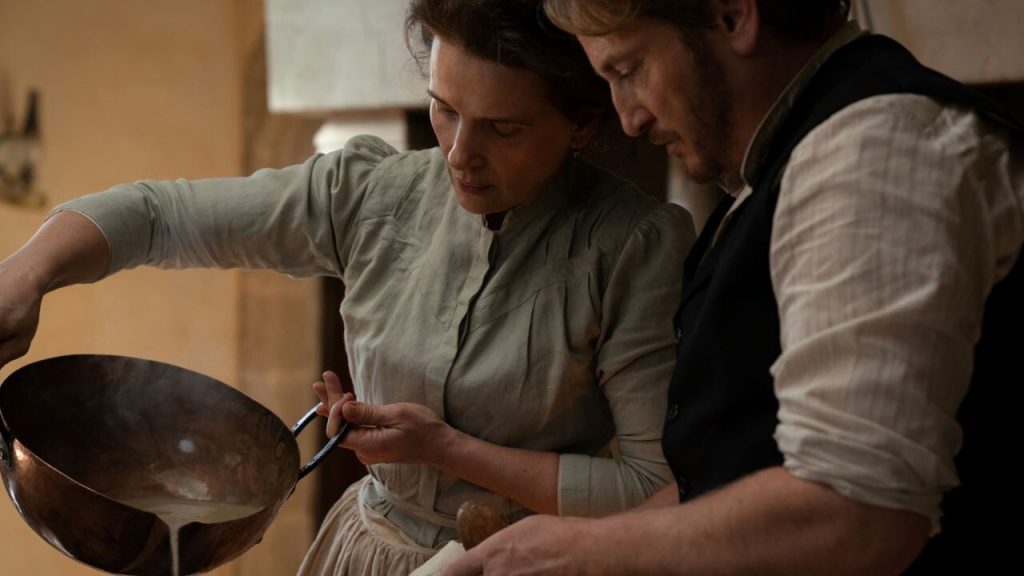‘The Taste of Things’ Is a Jewel
Lovely French film about food and love stands out even compared to Oscar winners.
For five months I had been pursuing The Taste of Things, figuring a major winner in foreign film festivals boasting a sterling international cast (including previous Oscar winner Juliette Binoche) and noted Vietnamese born French director Trân Anh Hùng would have to be in the Oscar mix – or available in streaming.
It wasn’t. Though I believe many in the 2024 Oscar voting pool saw it thanks to its high reputation by mid-2023, it didn’t get a big push, maybe because the ads focused on gourmet food and an enormous French country kitchen of bustling action in what was really a touching middle-age love story amid the late 19th century world of gourmands.
But the film didn’t even have a website until February and only now is getting occasionally booked in theaters. The Milwaukee Film Festival is smart enough to make it a highlight, anchoring the middle of the festival with three showings – 4 p.m. Sunday, April 14 at the Downer Theatre, 2 p.m. Wednesday, April 17 at the Oriental and again at 4:30 p.m. Friday April 19 at the Downer.
It serves as a startling example of how the best films of 2023 didn’t all make the Oscar parade, and how the Milwaukee festival helps fill such gaps. The Taste of Things is a among a number of films that may be overlooked amid the commercial guessing games, studio pushes, and other factors that play a sometime strange part in the Academy Awards. It’s worth stepping back to look at the Oscars to and how films like this got missed, and provide some context for how distinctive The Taste of Things is.
Mentally I separate the 10 “best” films selected for the Oscar voters into two cinematic categories — big films with epic themes (often with a flamboyant auteur director) that were given strong pushoffs and little films that surprised the voters with human and artistic elements to value. One film, The Zone of Interest, straddles the middle.
The Oscar winners generally came from the first group. The big winner was Chris Nolan’s Oppenheimer (you can’t get much bigger than the creation of the A-bomb). This category also included Barbie, which to the annoyance of many was passed over for Greta Gerwig as director but not as screenwriter.
A mystical Frankenstein fantasy set in 19th century Europe but drawing all its bizarre oomph from a modern vision of the sexes and what might happen if a baby’s brain was installed in a physically grown woman, Poor Things landed Emma Stone the best actress award for her delightful mix of herky-jerky movements and innocent promiscuity. It also features haunting performances from Willem Dafoe and Mark Ruffalo.
Another fine film based on fact though maybe too relentlessly epic – Martin Scorsese’s Killers of the Flower Moon, detailing how greedy white men killed wealthy Indians in Oklahoma – was surprisingly wiped out.
Also much neglected by Oscar was Bradley Cooper’s Maestro, maybe because it focused too strongly on conductor Leonard Bernstein’s sexual affairs (both men and women) and didn’t deal in depth with his actual musical gifts, his human rights work and his impact as a teacher.
There were other “best” films where I would have expected to find The Taste of Things (and now that I’ve seen it am even more mystified). Discussing Taste first, it excels in acting, eloquence in talking about the mysteries of the heart as well as how to make a Baked Alaska, in the dark luxury of its 19th century French mansion, in its assembly of gourmand characters — and the food!
The household staff under cook Eugenie (Binoche) and the menus of master chef Dodin (eminent French actor, and former husband to Binoche, Benoit Magimet) pull incredible sauces together as if nothing but a day’s work (which it is), cream pouring freely yet delicately seasoned, turbots skinned and soaked in milk, pastry sealed over entrees, a simple consommé as notable as a roast veal, a chef and a cook so entranced by their own artistry and personalities that we become the same.
There are intimate and off-putting moments as this ensemble of gourmets discuss ancient stories, smoke cigars and out of courtesy hide their entire heads under napkins to enjoy a delicacy. Director Hùng’s constant cuts combined with rolling pasture sequences bring sensuality and humanity to the observed events.
There is also a neighborhood girl Pauline (a memorable presence by Bonnie Chagneau-Ravoire) whose palate is challenged by Dodin and whose tasting success brings smiles of pleasure to Eugenie, one of the human connections that dot the film.
Of course, looking back to a forgotten and rather indulgent elegance, we realize such seven course meals are long gone. They would feed my large family for a month and wouldn’t pass modern medical muster, though the care with which the vegetables are raised and chopped, and the birds and fishes are rendered remain admirable epicurean skills.
The gourmands are also gossiping historians, ready to discuss who said what about food centuries ago and where to get the best vegetables, best fish, best birds, best calves.
Privileged they may be, but also very human and caring about their friend Dodin who has long been in love with Eugenie, and she is open to him on some nights but refuses to marry. In desperation he cooks for her. The love affair beckons us in. Her fainting spells fill us with dread. The romance and the food are flavored with poetic elegance – very French with English subtitles.
Two Oscar films also won at the same Cannes. One was The Zone of Interest, which inverts the usual way the Nazi genocide against Jews is projected.
It is what director Steven Spielberg has called the best Holocaust film (aside from his own Schindler’s List), but quite different. No piles of bodies here, except in our minds. Zone focuses on a Nazi family living pastorally on the other side of the wall from Auschwitz – the commandant, his wife and children (just look at the grisly toys they play with). Except for smoke from passing death trains, except for nightmare sequences of secret potato picking, the death camp is never seen. The bucolic family on the outside that has helped create these horrors reminds us how readily inhumanity was created and accepted.
Director Jonathan Glazer, in winning the best foreign film award at the Oscars, did Zone no favor in his clumsy but well-meaning effort to associate the Holocaust with Palestine, but the film makes no such selectivity. It is about the banality of evil – and left on that level it is even more compelling. It pressures the soul of all people.
Sandra Huller is the self-absorbed German wife, and she is also the warm mother (nominated for an Oscar) victimized in Anatomy of a Fall, set in a modern Alpine home. In three languages, it is a trial thriller in which a husband falls to his death and the wife is taken to court. Modern everyday technology, a half blind son and a fetching dog have been fashioned into a drama that keeps the audience guessing, even after it’s over.
Among the Oscar best films there was also Past Lives from South Korea, a near rom-com steeped in Internet technology in which two childhood friends ignite twice as adults in something more than friendship and less than passion.
The Holdovers features Paul Giamatti in a winning portrayal as a crochety schoolteacher with Da’Vine Joy Randolph chosen best supporting actress by Oscar as a low-key grieving kitchen worker. It is the acting more than originality that spurs the warmth and humor.
American Fiction is a wicked satire about assuming all blacks are alike – led by a wonderful performance by Jeffry Wright as a serious writer who achieves fame by writing like a black pimp.
These were all interesting films, but I would argue that The Taste of Things is as good as many and better than some. Certainly more tightly directed. There are some expensive streaming rentals out there, but I recommend savoring both the love and the food with an audience, which the Milwaukee Film Festival allows.
To repeat the opportunities, the showings are at 4 p.m. Sunday, April 14 at the Downer Theatre, 2 p.m. Wednesday, April 17 at the Oriental and again at 4:30 p.m. Friday April 19 at the Downer.
Dominique Paul Noth served for decades as film and drama critic, later senior editor for features at the Milwaukee Journal. You’ll find his blog here and here.
If you think stories like this are important, become a member of Urban Milwaukee and help support real, independent journalism. Plus you get some cool added benefits.
Milwaukee Film Festival
-
Film Festival Tickets On Sale April 13
 Apr 12th, 2025 by Dominique Paul Noth
Apr 12th, 2025 by Dominique Paul Noth
-
Check Out These Milwaukee-Made Films At The Film Festival
 Apr 14th, 2024 by Jeramey Jannene
Apr 14th, 2024 by Jeramey Jannene
-
The Unknown Joan Baez
 Apr 11th, 2024 by Dominique Paul Noth
Apr 11th, 2024 by Dominique Paul Noth
Review
-
Eating Burmese in Bay View
 Dec 13th, 2025 by Cari Taylor-Carlson
Dec 13th, 2025 by Cari Taylor-Carlson
-
Casablanca Is a Milwaukee Success
 Nov 30th, 2025 by Cari Taylor-Carlson
Nov 30th, 2025 by Cari Taylor-Carlson
-
Oh, Those Witty 18th Century Brits
 Nov 24th, 2025 by Dominique Paul Noth
Nov 24th, 2025 by Dominique Paul Noth




















